Sunday, November 17. 2013
Petropavl in northern Kazakhstan
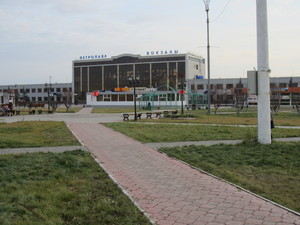 After a two-night train trip I arrived in Kazakhstan in the town Petropavl / Петропавл, also known under the name Petropavlovsk (which should not be confused with Petropavlovsk in Russia, where a town with the same name exists). There was no particular reason why I went there except that there's a relatively fast train from Moscow. Going directly from Moscow to Kazakhstan's capital Astana or the ex-capital Almaty would've meant a trip with at least three nights in a train, which I thought would be too much.
After a two-night train trip I arrived in Kazakhstan in the town Petropavl / Петропавл, also known under the name Petropavlovsk (which should not be confused with Petropavlovsk in Russia, where a town with the same name exists). There was no particular reason why I went there except that there's a relatively fast train from Moscow. Going directly from Moscow to Kazakhstan's capital Astana or the ex-capital Almaty would've meant a trip with at least three nights in a train, which I thought would be too much.There's surprisingly little information you find online about Petropavl in English, although it's not that small (about 200.000 inhabitants). I can't add that much, as I only stayed for one night.
I had a booking for a hotel, which teached me a little lesson: Sometimes preparing to much may cause more hassle than it helps. I didn't find the hotel I've booked at the address where it was supposed to be. You may wonder how I fail to find a hotel, but you need to know that "hotel" here not necessarily means the same as you are used to be (big building with big sign "Hotel XY"). They're often hidden in flats inside normal buildings.
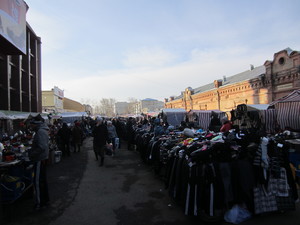 After checking the booking again I found out that it listed two addresses. One for the apartment and one as the contact address - and they were not nearby. No hint where I was supposed to go. While searching for my hotel, I found three other hotels which, by the way, were all much cheaper than everything that was bookable online. So finally I decided to forget my booking and just took one that seemed okay. Luckily, I could cancel my other booking without costs (I would've complained if I hadn't been able to do so) and ended up in a fine apartment, cheaper than planned and with a kitchen.
After checking the booking again I found out that it listed two addresses. One for the apartment and one as the contact address - and they were not nearby. No hint where I was supposed to go. While searching for my hotel, I found three other hotels which, by the way, were all much cheaper than everything that was bookable online. So finally I decided to forget my booking and just took one that seemed okay. Luckily, I could cancel my other booking without costs (I would've complained if I hadn't been able to do so) and ended up in a fine apartment, cheaper than planned and with a kitchen.Notable in Petropavl was a huge outdoor market. Although it's quite cold, it was crowded and seemed to be the normal way of shopping here. Not only food was sold, but anything from clothes to tools or car parts.
After spending a night, I took the train to the capital Astana.
Pictures Train Moscow-Petropavl
Pictures from Petropavl
Friday, November 15. 2013
Moscow and the Museum of Soviet Arcade Machines
 I had about six hours time in Moscow before entering my next train. A bit too much time for getting from one train station to another, eating and sitting around. So I looked for something to do while being in Moscow. I already visited the basic sights like the Red Square last time I was in Moscow, so I was looking for something more unusual.
I had about six hours time in Moscow before entering my next train. A bit too much time for getting from one train station to another, eating and sitting around. So I looked for something to do while being in Moscow. I already visited the basic sights like the Red Square last time I was in Moscow, so I was looking for something more unusual.I checked the Wikivoyage page of Moscow and one of the first things it mentions is the Museum of Soviet Arcade Machines. That sounded like it's worth a visit. I checked the location and it is quite centrally located, only a few minutes walk from the Metro station Baumanskaya. (If you exit the metro, you're already on Baumanskaya street and the Museum is in Baumanskaya street 11.)
As the name says, the museum features arcade machines from the soviet aera. You get a couple of real soviet 15 Kopek coins when entering that you can spend on playing. So I played some rounds of Magistral (Магистраль) - seems something like the soviet answer to Pacman - and others. Honestly, for many of the games I failed to understand how they were supposed to be played. What was interesting that there were a couple of "games" that featured non-virtual content. For example, there was a game where you could control a little toy tank called Tankodrom (танкодром), but I didn't really understand how to play that game either. Obviously there were quite a number of games with cold war references. The Museum also includes some tables where you can have a coffee after playing. If you ever happen to be in Saint-Petersburg, the museum has a branch there, too.
After that I went to Kazansky railway station where my next train was leaving. Moscow has several train stations and some of them are named after the countries where their international trains are heading. So for me that meant I entered Moscow at the Belorussky railway station (because I came through Belarus) and I left at Kazansky railway station (because I was heading to Kazakhstan). (someone in the comments told me this is wrong and Kazaksny station refers to the city Kazan - so I was probably wrong on this naming)
Pictures from the Museum of Soviet Arcade Machines in Moscow
Posted by Hanno Böck
in Computer culture, English, Life, Retro Games
at
16:45
| Comment (1)
| Trackbacks (0)
Defined tags for this entry: arcade, asia2013, computerhistory, magistral, moscow, museum, retro, retrogames, russia, tankodrom
Entering Russia and the migration card
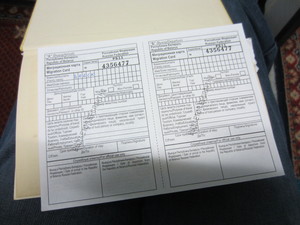
Russian migration card
The migration card is a double-form where you have to fill in some of your basic data. It's then stamped by the border guards and split in half. They keep one half, you get the other and keep it until you leave the country again. From what I've heard, one of the more troublesome things you can encounter is losing your migration card while in Russia.
There are some tricky things to know about the migration card. First: If you enter Russia through Belarus, you'll get only one migration card for both countries. That bothered me a lot on my last trip, because I only entered the data for Belarus, that means a stay of one day. Turned out this wasn't a big issue. When leaving Russia the border guards had a more closer look on the documents and obviously noticed the misinformation, but they didn't seem to care that much.
There seem to be similar issues with other countries. I even once got a migration card at the Ukrainian border, where I didn't want to enter Russia at all. It just happened that I was sitting in a train that was going to Russia after crossing the Ukraine. So if you ever happen to enter Russia through another country, although you don't necessarily get the migration card at the Russian border, you should enter the data for your stay in Russia.
Another thing I learned this time: There is a field for the Visa number. Now I obviously had two Visa - one for Belarus and one for Russia. I filed the number of the Russian one, because after all, I wanted to go to Russia and only cross Belarus on a train. Turned out I was wrong and the Belarus border guards complained. Admittedly, it can be a bit frightening if a border guard tells you something is wrong, especially if you don't understand their language. But after all, he just filled in the correct Visa number himself and everything was okay.
Kazakhstan also has a migration card, but it is not split in half and no similar pitfalls seem to occur there.
Tuesday, November 12. 2013
Travelling again
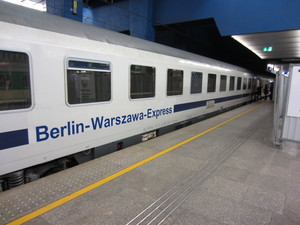 If you've been reading my blog back in 2011, you'll remember that I did a two-month-long trip on the transsiberian railway through Russia, Mongolia and China. Ever since the idea was in my head that I wanted to do something alike again.
If you've been reading my blog back in 2011, you'll remember that I did a two-month-long trip on the transsiberian railway through Russia, Mongolia and China. Ever since the idea was in my head that I wanted to do something alike again.So today I am starting a new journey to Asia, again mostly by train. Slightly modified from last time, as I don't need to see all the places again I've already been. I started today at 6 am in Berlin and I'm currently in Warsaw, Poland (where the 19th world climate conference is just starting, but that's purely a coincidence). I'll only spend a couple of hours in Warsaw and then will continue my trip to Moscow. From there, I'll head on to Kazakhstan and later to China. If everything works out as intended, I'll hopefully spend parts of the winter in warm and sunny areas.
I make no promises, but I'll try to keep my blog updated with pictures and events happening on my trip.
Technical note: All entries related to this trip will be marked with the tag asia2013. All entries related to my previous trip to asia can be found under the tag trip2011. Pictures will be collected here.
Sunday, October 20. 2013
Strange places - the Crooked Forest
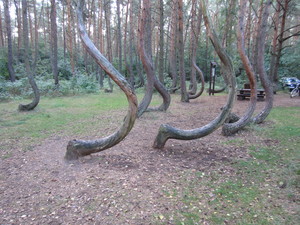 Some time ago I stumbled upon this webpage, which lists a couple of extraordinary travel destinations.
Some time ago I stumbled upon this webpage, which lists a couple of extraordinary travel destinations.One of them catched my attention: The so-called "Crooked Forest" near Gryfino in Poland. Now, it certainly isn't the most spectacular on that list. But it has one special feature which makes it interesting for me: From where I live (Berlin) it's not very far. So recently I went there by train and bike and had a look.
The Crooked Forest are a couple of pines that grow in really weird shapes, as you can see in the picture on the right. It is not entirely certain what the reason for those weird-looking trees is. Wikipedia has some information, which - interestingly - is different in the english and german article about it.
Some more pictures of the Crooked Forest
Sunday, September 29. 2013
226 Kilowattstunden
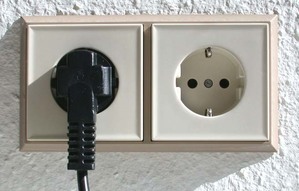 Ich habe gerade die Jahresabrechnung von meinem Stromanbieter bekommen. 452 Kilowattstunden für einen 2-Personen-Haushalt. Zum Vergleich: Der Durchschnitt liegt bei circa 3200 Kilowattstunden. Mein Stromanbieter sagt mir, dass 1000-2000 Kilowattstunden in meinem Fall bereits "sehr gut" wären - mein Stromverbrauch ist in der dargestellten Übersicht überhaupt nicht vorgesehen.
Ich habe gerade die Jahresabrechnung von meinem Stromanbieter bekommen. 452 Kilowattstunden für einen 2-Personen-Haushalt. Zum Vergleich: Der Durchschnitt liegt bei circa 3200 Kilowattstunden. Mein Stromanbieter sagt mir, dass 1000-2000 Kilowattstunden in meinem Fall bereits "sehr gut" wären - mein Stromverbrauch ist in der dargestellten Übersicht überhaupt nicht vorgesehen.Zugegeben hab ich einige Vorteile, auf die man zumindest als Mieter meist wenig Einfluss hat. Die Wohnung hat einen Gasherd und die Heizung läuft via Fernwärme. Die in vielen Wohnungen größten Stromverbraucher fallen damit weg. Ansonsten mache ich aber nur Dinge, die relativ banal sind:
- Beim Kauf von *allen* elektronischen Geräten versuche ich auf den Stromverbrauch zu achten. Leider ist das oft schwierig - denn in vielen Fällen verschweigen einem die Hersteller den Stromverbrauch.
- Besonderes augenmerk auf a) Großgeräte und b) Geräte, die permanent laufen. Das bedeutet vor allem: Kühlschrank und Waschmaschine sollten sparsam sein, aber auch so Dinge wie Telefon, Router oder Modem. Die brauchen zwar nicht viel, laufen aber immer oder fast immer.
- Alle Geräte, die aktuell nicht gebraucht werden, werden ausgeschaltet. Für meinen Schreibtisch bedeutet das etwa: Eine Steckdosenleiste, an der sich jede Dose einzeln abschalten lässt.
- Geräte, die multifunktional sind und sowieso wenig Strom brauchen, sollte man auch multifunktional nutzen. Beispiel Laptop: Die sind generell sehr stromsparend, damit der Akku lange hält. Einen Desktop-PC zu nutzen, wenn es der Laptop auch tut, ist sinnlos. Musik und Filme kann man ebenfalls damit abspielen.
(Bildquelle: Wikimedia Commons)
Thursday, September 19. 2013
Improved SSD performance on old Thinkpads with BIOS mod
Recently, my old harddisk produced some errors. As I care for my data, I immediately replaced it and decided to invest in an SSD.
My laptop (Lenovo Thinkpad T61) is already some years old, so I'm quite aware that I won't get the best possible performance out of it. But I found something really interesting. The BIOS seems to limit the SATA II speed and there's an unofficial BIOS mod to remove that limitation. It's also available for a couple of other Thinkpad models (beside T61 also for R61, X61, X300 and variants of them).
The BIOS mod also does a number of other things, for example the official BIOS has a whitelist of allowed wireless chips. That gets removed.
The full feature list from the readme file:
- Disabled whitelist check.
- Enabled SATA II full speed.
- Added SLIC 2.1 table.
- Removed "Thermal sensing error" boot message (Penryn CPUs).
- Added dual-IDA support.
Obivous Warning: You're doing this at your own risk. If any unofficial BIOS destroys your laptop or your data, that's bad luck. The only thing I can tell is that I didn't experience any problems and that so far, a lot of people seem to use these BIOS mods without problems.
Now I did some before-after-benchmarking. I used hdparm -tT /dev/sda and a simple dd if=/dev/zero of=/tmp/out.img bs=8k count=256k. I started the benchmark after a fresh boot without anything else running to avoid disturbances. I ran the tests a couple of times and will only give you the last result of each tests, but they didn't differ much. The results:
Quite impressive, isn't it? I just doubled the speed of my disk for free. I'm aware that benchmarking is a tricky business and the impact this has on my overall system performance is probably difficult to put in numbers, but the results are significant enough that I think it was worth it.
Slightly related: There's also a modified firmware for the Optiarc AD7910A CD/DVD burner that's shipped in my laptop.
My laptop (Lenovo Thinkpad T61) is already some years old, so I'm quite aware that I won't get the best possible performance out of it. But I found something really interesting. The BIOS seems to limit the SATA II speed and there's an unofficial BIOS mod to remove that limitation. It's also available for a couple of other Thinkpad models (beside T61 also for R61, X61, X300 and variants of them).
The BIOS mod also does a number of other things, for example the official BIOS has a whitelist of allowed wireless chips. That gets removed.
The full feature list from the readme file:
- Disabled whitelist check.
- Enabled SATA II full speed.
- Added SLIC 2.1 table.
- Removed "Thermal sensing error" boot message (Penryn CPUs).
- Added dual-IDA support.
Obivous Warning: You're doing this at your own risk. If any unofficial BIOS destroys your laptop or your data, that's bad luck. The only thing I can tell is that I didn't experience any problems and that so far, a lot of people seem to use these BIOS mods without problems.
Now I did some before-after-benchmarking. I used hdparm -tT /dev/sda and a simple dd if=/dev/zero of=/tmp/out.img bs=8k count=256k. I started the benchmark after a fresh boot without anything else running to avoid disturbances. I ran the tests a couple of times and will only give you the last result of each tests, but they didn't differ much. The results:
| before | after | |
| hdparm cached read | 3069.01 MB/s | 6900.56 MB/s |
| hdparm buffered read | 131.38 MB/s | 251.79 MB/s |
| dd write | 106 MB/s | 209 MB/s |
Quite impressive, isn't it? I just doubled the speed of my disk for free. I'm aware that benchmarking is a tricky business and the impact this has on my overall system performance is probably difficult to put in numbers, but the results are significant enough that I think it was worth it.
Slightly related: There's also a modified firmware for the Optiarc AD7910A CD/DVD burner that's shipped in my laptop.
Wednesday, September 4. 2013
My AC100 travel laptop
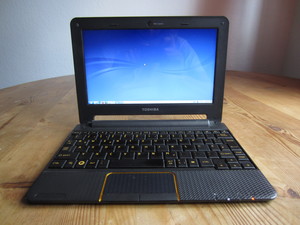 I recently noted that I have never blogged about this nice little device I now own for a couple of years. I originally bought the Toshiba AC100 before a two-month-long trip through Russia and China.
I recently noted that I have never blogged about this nice little device I now own for a couple of years. I originally bought the Toshiba AC100 before a two-month-long trip through Russia and China.I was looking for a possibility to have a basic laptop, but without much weight. The AC100 is an ARM-based laptop which originally ships with the Android operating system. It weights less than 800 gramms and thus is lighter than the usual subnotebooks. According to my knowledge, it's not produced any more, but it can still be bought on ebay.
The nice thing is: You can install Linux on it and thus it will give you the possibility to run an almost full desktop-system. Though a warning ahead: While basic things work, it is quite a hacky business and you should expect to see problems. If you aren't prepared to solve them, this is probably not the solution for you.
Originally I was running Gentoo Linux on it (and it did well on my two-month trip), but now I'm running Ubuntu. The reason is that it was just too hard to get anything fixed if it didn't work. I rarely could find help anywhere, I assume there are only a handful of people that ever tried installing Gentoo on this Device. Ubuntu up until version 12.10 has reasonable support.
The great thing is: This is probably one of the lightest solutions to have a desktop/laptop-like machine with a real keyboard. Perfect for travelling. As it's running Linux, you can have access to a large number of standard applications. With lightweight apps like Abiword or Claws-Mail you can use basic applications.
The limitations are the Browser and Video. You can run Chromium or Firefox, but the device clearly shows its limits. Expect to wait longer sometimes, don't open too many tabs - and I always have to remember to never try to open Chromium and Firefox at the same time, as this makes the system mostly unusable. Obviously there's no Flash and nothing else that's only available in binary form, because ARM Linux is such a niche OS that nobody will provide binary apps for it.
Videos work, but limited. There's no xv support in the free driver. That means if you want to upscale a video to fullscreen, this has to be done in software and that usually means you cannot play videos fast enough. There's a binary graphics driver by Nvidia (the internals of the device are based on the Nvidia Tegra chipset), but I haven't had much success with it.
Posted by Hanno Böck
in Computer culture, English, Gentoo, Linux
at
17:23
| Comments (9)
| Trackbacks (0)
Wednesday, July 17. 2013
Stuff and Minimalism
It was about a year ago when I first read about a movement of people calling themselves "Minimalists". The basic idea is: Live with less stuff - because most likely you won't need much of it. I quickly became fascinated by the idea and would call myself a Minimalist today.
I've never been someone to own a lot of stuff. But still, when I gathered through my belongings I could find a whole lot of things I haven't used in ages. I kept far too much stuff, just because "I might need it some day". A small example might illustrate this: I had a 10 meter audio cable. I used it back when I was a kid to connect my PC with my hi-fi system. I haven't used it for more than 10 years. I've carried it around through several different flats. I had the thought in the back of my mind that "this cable wasn't that cheap". I did a quick check: A similar cable costs around 4 Euro, shipping included. If I ever needed one again I could easily get it. Now a single cable isn't relevant. But I had two boxes full of electronics that I got rid of. I was baffled how much stuff I just could get rid of without missing it at all.
This may all sound very banal, but it has very practical advantages. After all, you have to store your stuff somewhere - basically you're paying rent for it. It makes moving more difficult. It makes cleaning your home more difficult. But beside that, I feel another advantage, one that I've more problems to describe. It's a feeling of freedom. Somehow I felt responsible for "my stuff". There's all this stuff and I basically have no overview what's in it. There may be things that cause me trouble. Not that I had anything specific in mind or that I could name the kind of "trouble" I was thinking of. It was just a vague feeling. It just feels better to think "I basically know my stuff". I couldn't name every single piece, but as of today I'm pretty sure that there's nothing in it that would surprise me.
There's a whole bunch of webpages and blogs around Minimalism on the web. If you're curious, a good starting point might be theminimalists.com by two guys named Joshua Fields Millburn and Ryan Nicodemus.
I've never been someone to own a lot of stuff. But still, when I gathered through my belongings I could find a whole lot of things I haven't used in ages. I kept far too much stuff, just because "I might need it some day". A small example might illustrate this: I had a 10 meter audio cable. I used it back when I was a kid to connect my PC with my hi-fi system. I haven't used it for more than 10 years. I've carried it around through several different flats. I had the thought in the back of my mind that "this cable wasn't that cheap". I did a quick check: A similar cable costs around 4 Euro, shipping included. If I ever needed one again I could easily get it. Now a single cable isn't relevant. But I had two boxes full of electronics that I got rid of. I was baffled how much stuff I just could get rid of without missing it at all.
This may all sound very banal, but it has very practical advantages. After all, you have to store your stuff somewhere - basically you're paying rent for it. It makes moving more difficult. It makes cleaning your home more difficult. But beside that, I feel another advantage, one that I've more problems to describe. It's a feeling of freedom. Somehow I felt responsible for "my stuff". There's all this stuff and I basically have no overview what's in it. There may be things that cause me trouble. Not that I had anything specific in mind or that I could name the kind of "trouble" I was thinking of. It was just a vague feeling. It just feels better to think "I basically know my stuff". I couldn't name every single piece, but as of today I'm pretty sure that there's nothing in it that would surprise me.
There's a whole bunch of webpages and blogs around Minimalism on the web. If you're curious, a good starting point might be theminimalists.com by two guys named Joshua Fields Millburn and Ryan Nicodemus.
Posted by Hanno Böck
in English, Life
at
22:19
| Comments (0)
| Trackbacks (0)
Defined tags for this entry: minimalism, stuff
Wednesday, May 29. 2013
Berlin: Unterstützt das Volksbegehren des Energietischs
 Das was ihr auf dem Bild rechts sehen könnt ist der Tagebau Jänschwalde - ein riesiges Loch in der Landschaft. Im Hintergrund zu sehen ist eines von Europas klimaschädlichsten Kohlekraftwerken.
Das was ihr auf dem Bild rechts sehen könnt ist der Tagebau Jänschwalde - ein riesiges Loch in der Landschaft. Im Hintergrund zu sehen ist eines von Europas klimaschädlichsten Kohlekraftwerken.Verantwortlich für dieses und viele weitere Löcher in der Landschaft ist der Energiekonzern Vattenfall. Dabei geht es nicht nur um bestehende Tagebaue. Vattenfall versucht ganz aktuell sehr aktiv, weitere Braunkohletagebaue aufzuschließen und bestehende zu vergrößern. Der Konzern ist einer der größten Bremser bei der Energiewende.
Aktuell haben alle Einwohner von Berlin eine einmalige Möglichkeit, dagegen ein Zeichen zu setzen. Das Volksbegehren des Berliner Energietischs versucht, die Stromversorgung der Hauptstadt wieder in städtische Hand zu bekommen. Ein Volksbegehren verläuft in Berlin in drei Phasen. Zuerst muss eine kleine Zahl von Unterschriften gesammelt werden (das ist bereits vorbei), in der zweiten Phase dann eine deutlich größere Zahl - das läuft gerade. Wenn auch die zweite Phase erfolgreich verläuft findet ein Volksentscheid statt.
Die Unterschriftensammlung läuft nur noch wenige Tage. Aktuell sieht es so aus, dass es vermutlich recht knapp wird. Insofern, falls ihr die Sache ebenfalls unterstützenswert findet: Ladet Euch doch eine Unterschriftenliste herunter, druckt sie aus, unterschreibt und fragt noch ein paar Menschen, die grad in Eurer Nähe sind, ob sie ebenfalls unterschreiben wollen. Die Unterschriften müssen bis zum 10. Juni beim Energietisch sein, wenn ihr die Listen bis zum 6. Juni abschickt sollten sie noch rechtzeitig ankommen. (Danach könnt ihr sie immer noch an einem der Infopunkte abgeben).
http://www.berliner-energietisch.net/
Update: Mit 265.000 Unterschriften wurde das Ziel deutlich erreicht. Im Herbst, möglicherweise zeitgleich zur Bundestagswahl, wird es nun einen Volksentscheid geben.
Thursday, May 9. 2013
In eigener Sache - Umbau
Seit 2004 existiert nun dieses Blog von mir. Zeitweise viel genutzt, zeitweise weniger und in letzter Zeit kaum noch. Ein privates Projekt, ein Ort, an dem ich schreiben konnte was ich wollte.
Zwischenzeitlich hat sich bei mir einiges geändert. Ich schreibe weiterhin viel und gern, aber selten hier. Ich bin inzwischen primär als freier Journalist tätig und meine Texte können unter anderem bei der taz, bei Golem, bei Telepolis und gelegentlich sogar bei Zeit online gelesen werden. Mein Blog entwickelte sich zum unpassenden Relikt, gleichzeitig habe ich das Gefühl, dass ich endlich eine Selbstdarstellungsseite für meine journalistische Arbeit benötige und mein Blog dafür in seiner aktuellen Form denkbar ungeeignet ist.
Deshalb wird jetzt hier umgebaut. Mein Blog soll weiter existieren, zum einen natürlich als Archiv und zum anderen soll es nicht ganz sterben. Es wird immer wieder Anlässe geben, die für einen Blogeintrag besser geeignet sind als für einen journalistischen Text. Und wer weiß, je nach Laune wird es vielleicht auch wieder lebendiger.
Das Blog wird künftig unter blog.hboeck.de beheimatet. Abgesehen von der Startseite werden alle alten Links umgeleitet. Probleme bereiten könnte das für manche Feedreader und Aggregatoren. Alles, was HTTP-Redirects versteht, sollte weiter seine Inhalte finden.
Unter der Hauptdomain hboeck.de soll dann irgendwann ein Überblick über meine journalistische Arbeit zu finden sein. Vorerst gibt's hier auch schon eine notdürftige Übersicht über von mir verfasste Beiträge in anderen Medien.
Zwischenzeitlich hat sich bei mir einiges geändert. Ich schreibe weiterhin viel und gern, aber selten hier. Ich bin inzwischen primär als freier Journalist tätig und meine Texte können unter anderem bei der taz, bei Golem, bei Telepolis und gelegentlich sogar bei Zeit online gelesen werden. Mein Blog entwickelte sich zum unpassenden Relikt, gleichzeitig habe ich das Gefühl, dass ich endlich eine Selbstdarstellungsseite für meine journalistische Arbeit benötige und mein Blog dafür in seiner aktuellen Form denkbar ungeeignet ist.
Deshalb wird jetzt hier umgebaut. Mein Blog soll weiter existieren, zum einen natürlich als Archiv und zum anderen soll es nicht ganz sterben. Es wird immer wieder Anlässe geben, die für einen Blogeintrag besser geeignet sind als für einen journalistischen Text. Und wer weiß, je nach Laune wird es vielleicht auch wieder lebendiger.
Das Blog wird künftig unter blog.hboeck.de beheimatet. Abgesehen von der Startseite werden alle alten Links umgeleitet. Probleme bereiten könnte das für manche Feedreader und Aggregatoren. Alles, was HTTP-Redirects versteht, sollte weiter seine Inhalte finden.
Unter der Hauptdomain hboeck.de soll dann irgendwann ein Überblick über meine journalistische Arbeit zu finden sein. Vorerst gibt's hier auch schon eine notdürftige Übersicht über von mir verfasste Beiträge in anderen Medien.
Posted by Hanno Böck
in Life
at
15:44
| Comments (0)
| Trackbacks (0)
Defined tags for this entry: blog
Tuesday, March 5. 2013
Questioning copyright treaties
Yesterday, I read a news about the green party's proposals for a copyright reform (strictly speaking, there's no copyright in Germany, it's called "Urheberrecht", but I'll stick with the term copyright, because it's commonly understood). One point was that they claimed they don't see any perspectives for a so-called cultural flatrate due to EU law. The basic idea of a cultural flatrate is that it would legalize private filesharing while putting a fee on internet access.
My point is more the reasoning than the issue itself. Because that's a repeating pattern. Whenever someone makes a proposal to change something relevant in copyright or patent law, this is pretty much always the conclusion: It's not possible due to one or another international law or treaty. The discussion ends before anyone can make any real argument why some copyright change might be a good idea or not.
The EU directive that, according to the green party, forbids a cultural flatrate is the EU Copyright Directive from 2001. This directive is itself an implementaiton of the WIPO Copyright Treaty from 1996.
Other treaties that are often relevant are the Berne Convention and the TRIPS Agreement of the WTO from 1994.
What all of those treaties have in common and what I find - in its combination - very troubling:
My point is more the reasoning than the issue itself. Because that's a repeating pattern. Whenever someone makes a proposal to change something relevant in copyright or patent law, this is pretty much always the conclusion: It's not possible due to one or another international law or treaty. The discussion ends before anyone can make any real argument why some copyright change might be a good idea or not.
The EU directive that, according to the green party, forbids a cultural flatrate is the EU Copyright Directive from 2001. This directive is itself an implementaiton of the WIPO Copyright Treaty from 1996.
Other treaties that are often relevant are the Berne Convention and the TRIPS Agreement of the WTO from 1994.
What all of those treaties have in common and what I find - in its combination - very troubling:
- They've been created at a time where many people affected by it today weren't allowed to vote or even weren't born.
- They were created in a time where the Internet as we know it today and the issues related to it simply didn't exist.
- It's hard to impossible to change those treaties.
- There has never been a wide public discussion about any of those treaties, the terms TRIPS, Berne Convention or WIPO copyright treaty are mostly unknown to the general public.
Posted by Hanno Böck
in Computer culture, Copyright, Politics
at
21:44
| Comment (1)
| Trackbacks (0)
Defined tags for this entry: berneconvention, copyright, culturalflatrate, eu, eucopyrightdirective, trips, wipo
Saturday, January 26. 2013
Explain hard stuff with the 1000 most common words #UPGOERFIVE
Based on the XKCD comic "Up Goer Five", someone made a nice little tool: An online text editor that lets you only use the 1000 most common words in English. And ask you to explain a hard idea with it.
Nice idea. I gave it a try. The most obvious example to use was my diploma thesis (on RSA-PSS and provable security), where I always had a hard time to explain to anyone what it was all about.
Well, obviously math, proof, algorithm, encryption etc. all are forbidden, but I had a hard time with the fact that even words like "message" (or anything equivalent) don't seem to be in the top 1000.
Here we go:
When you talk to a friend, she or he knows you are the person in question. But when you do this a friend far away through computers, you can not be sure.
That's why computers have ways to let you know if the person you are talking to is really the right person.
The ways we use today have one problem: We are not sure that they work. It may be that a bad person knows a way to be able to tell you that he is in fact your friend. We do not think that there are such ways for bad persons, but we are not completely sure.
This is why some people try to find ways that are better. Where we can be sure that no bad person is able to tell you that he is your friend. With the known ways today this is not completely possible. But it is possible in parts.
I have looked at those better ways. And I have worked on bringing these better ways to your computer.
So - do you now have an idea what I was taking about?
I found this nice tool through Ben Goldacre, who tried to explain randomized trials, blinding, systematic review and publication bias - go there and read it. Knowing what publication bias and systematic reviews are is much more important for you than knowing what RSA-PSS is. You can leave cryptography to the experts, but you should care about your health. And for the record, I recently tried myself to explain publication bias (german only).
Nice idea. I gave it a try. The most obvious example to use was my diploma thesis (on RSA-PSS and provable security), where I always had a hard time to explain to anyone what it was all about.
Well, obviously math, proof, algorithm, encryption etc. all are forbidden, but I had a hard time with the fact that even words like "message" (or anything equivalent) don't seem to be in the top 1000.
Here we go:
When you talk to a friend, she or he knows you are the person in question. But when you do this a friend far away through computers, you can not be sure.
That's why computers have ways to let you know if the person you are talking to is really the right person.
The ways we use today have one problem: We are not sure that they work. It may be that a bad person knows a way to be able to tell you that he is in fact your friend. We do not think that there are such ways for bad persons, but we are not completely sure.
This is why some people try to find ways that are better. Where we can be sure that no bad person is able to tell you that he is your friend. With the known ways today this is not completely possible. But it is possible in parts.
I have looked at those better ways. And I have worked on bringing these better ways to your computer.
So - do you now have an idea what I was taking about?
I found this nice tool through Ben Goldacre, who tried to explain randomized trials, blinding, systematic review and publication bias - go there and read it. Knowing what publication bias and systematic reviews are is much more important for you than knowing what RSA-PSS is. You can leave cryptography to the experts, but you should care about your health. And for the record, I recently tried myself to explain publication bias (german only).
Posted by Hanno Böck
in Cryptography, English, Life, Science, Security
at
11:51
| Comments (0)
| Trackbacks (0)
Saturday, January 19. 2013
How to configure your HTTPS server
Yesterday, we had a meeting at CAcert Berlin where I had a little talk about how to almost-perfectly configure your HTTPS server. Motivation for that was the very nice Qualys SSL Server test, which can remote-check your SSL configuration and tell you a bunch of things about it.
While playing with that, I created a test setup which passes with 100 points in the Qualys test. However, you will hardly be able to access that page, which is mainly due to it's exclusive support for TLS 1.2. All major browsers fail. Someone from the audience told me that the iPhone browser was successfully able to access the page. To safe the reputation of free software, someone else found out that the Midori browser is also capable of accessing it. I've described what I did there on the page itself and you may also read it here via http.
Here are my slides "SSL, X.509, HTTPS - How to configure your HTTPS server" as ODP, as PDF and on Slideshare.
And some links mentioned in the slides:
Check SSL and SSH weak keys due to broken random numbers
EFF SSL Observatory
Sovereign Keys proect
Some great talks on the mentioned topics by others:
Facthacks Talk 29c3
MD5 considered harmful today - Creating a rogue CA Certificate
Is the SSLiverse a safe place?
Update: As people seem to find these browser issue interesting: It's been pointed out that the iPad Browser also works. Opera with TLS 1.2 enabled seems to work for some people, but not for me (maybe Windows-only). luakit and epiphany also work, but they don't check certificates at all, so that kind of doesn't count.
While playing with that, I created a test setup which passes with 100 points in the Qualys test. However, you will hardly be able to access that page, which is mainly due to it's exclusive support for TLS 1.2. All major browsers fail. Someone from the audience told me that the iPhone browser was successfully able to access the page. To safe the reputation of free software, someone else found out that the Midori browser is also capable of accessing it. I've described what I did there on the page itself and you may also read it here via http.
Here are my slides "SSL, X.509, HTTPS - How to configure your HTTPS server" as ODP, as PDF and on Slideshare.
And some links mentioned in the slides:
Check SSL and SSH weak keys due to broken random numbers
EFF SSL Observatory
Sovereign Keys proect
Some great talks on the mentioned topics by others:
Facthacks Talk 29c3
MD5 considered harmful today - Creating a rogue CA Certificate
Is the SSLiverse a safe place?
Update: As people seem to find these browser issue interesting: It's been pointed out that the iPad Browser also works. Opera with TLS 1.2 enabled seems to work for some people, but not for me (maybe Windows-only). luakit and epiphany also work, but they don't check certificates at all, so that kind of doesn't count.
Posted by Hanno Böck
in Computer culture, Cryptography, Gentoo, Linux
at
11:45
| Comments (5)
| Trackbacks (0)
Defined tags for this entry: ca, cacert, certificate, cryptography, encryption, https, security, ssl, tls, x509
Friday, November 16. 2012
Brief an die Naturstrom AG
In Deutschland gibt es vier Stromanbieter, die man üblicherweise empfielt, wenn man nach einem vertrauenswürdigen Ökostromanbieter fragt. Lichtblick, Greenpeace Energy, die Naturstrom AG und die Elektrizitätswerke Schönau. Die taz hat nun eine spannende Geschichte: Drei der vier beziehen Strom von einem österreichischen Unternehmen, welches gerade in der Türkei ein Braunkohlekraftwerk baut.
Nun bin ich Kunde bei dem vierten Anbieter, der davon nicht betroffen ist - und den ich somit auch bedenkenlos weiterempfehlen kann: Die Elektrizitätswerke Schönau. Allerdings beziehe ich mein Gas von der Naturstrom AG. Diese haben nämlich auch einen Biogas-Tarif im Angebot (und sind - wie ich das in der Vergangenheit wahrgenommen habe - durchaus bemüht, dabei nicht Massentierhaltung und Maismonokulturen zu unterstützen).
Anlass genug für mich, dort mal nachzufragen. Wer seinem Anbieter ebenfalls schreiben will, darf das natürlich gerne als Vorlage verwenden (und ich bitte die teilweise etwas flapsigen Formulierungen zu entschuldigen - ich hatte ursprünglich nicht vor das zu veröffentlichen, bin aber gerade darum gebeten worden):
Sehr geehrte Damen und Herren,
Ich habe gestern diesen Artikel in der taz gelesen:
http://www.taz.de/Alternative-Stromlieferer/!105629/
Nun beziehe ich zwar von der Naturstrom AG keinen Strom, sondern nur Gas, aber trotzdem bewegt mich das Thema. Ich habe die Naturstrom AG bisher immer als vertrauenswürdig erlebt und als Unternehmen, das "Öko" nicht nur als Werbegimmick nutzt wie viele andere, sondern ernst nimmt.
Nun interessiert mich natürlich zum einen, wie die Naturstrom AG auf diese Enthüllungen reagieren will. Zum anderen interessiert mich aber auch, wie das überhaupt passieren konnte. Wenn ich mal ihre Webseite zitieren darf - dort steht: "Natürlich achten wir auch darauf, dass keine Atom- und Kohlekonzerne an den Erzeugungsanlagen beteiligt sind."
Es würde mich ja interessieren, wie das konkret aussieht. Denn eigentlich würde ich ja davon ausgehen, dass sie das nicht nur so sagen, sondern auch - bei Verhandlungen - in den Lieferverträgen festklopfen. Auch wäre es ja eigentlich wünschenswert, dass ein Ökostromunternehmen nicht nur Strom von Partnerunternehmen bezieht, sondern dort solche Entscheidungen beeinflusst, bevor sie getroffen werden. Der Bau des Braunkohlekraftwerks wird sich nun wohl - selbst wenn ihr Unternehmen und die beiden anderen betroffenen Ökostromer jetzt ihre Verbindungen mit der Verbund AG kappen - nicht mehr verhindern lassen.
Ich bin schon in gewisser Weise enttäuscht, dass so etwas passieren konnte. Von ihrer Antwort werde ich es sicher auch abhängig machen, ob ich weiter bei Ihnen mein Biogas beziehen möchte oder mir auch hier einen anderen Anbieter suche. Natürlich werde ich auch davon abhängig machen, ob ich sie künftig noch bedenkenlos an andere Menschen weiterempfehlen kann.
Mit freundlichen Grüßen, Hanno Böck
Update: Ich hab recht schnell eine Antwort bekommen:
Sie können uns glauben, dass wir uns sehr über die Kohlekraftwerkspläne der Verbund AG ärgern. Zu Ihren Fragen kann ich Ihnen folgende Auskunft geben:
naturstrom sieht die Beteiligung der Verbund AG an dem voraussichtlich 2015 in Betrieb gehenden Braunkohlekraftwerk Tufanbeyli äußerst kritisch und distanziert sich ausdrücklich von diesen Plänen. Daher hat naturstrom die Initiative für ein gemeinsames Vorgehen der betroffenen Ökostromanbieter gegenüber der Verbund AG übernommen. Unser Ziel ist, die Verbund AG von ihrem Vorhaben abzubringen und zum Verkauf der Projektbeteiligung zu bewegen. Ein Schreiben diesen Inhalts an die Verbund AG ist derzeit in Abstimmung. Darüber hinaus werden Gespräche mit Robin Wood sowie mit der Initiative "Atomausstieg selber machen" stattfinden, um die Situation zu besprechen und Lösungswege zu erarbeiten. Wie Robin Wood in ihrer eigenen Stellungnahme geschrieben hat, gelten im Stromgroßhandel Verträge über mehrere Jahre. Daher ist es unser Ansatz, die Verbund AG von der Aufgabe des Vorhabens zu überzeugen, bevor das Kraftwerk in ca. drei Jahren fertiggestellt wird.
Das liest sich für mich erstmal zumindest so, dass man das Problem ernst nimmt. Auf der Homepage von Greenpeace Energy gibt es inzwischen eine Stellungnahme, die allerdings eher wachsweich klingt. Bei Naturstrom und Lichtblick steht bisher nicht, was ich ein bißchen schwach finde.
Update 2: Da mich immer noch Leute auf diesen Blogbeitrag ansprechen: Inzwischen hat die Verbund AG sich von ihren Anteilen an dem türkischen Braunkohlekraftwerk getrennt. Die gehören jetzt E.ON (wer dort Kunde ist, sollte das eh schleunigst ändern - aber dafür braucht's als Grund kein weiteres Braunkohlekraftwerk). Ich wollte mit dem Blogeintrag auch nicht sagen, dass ich die genannten Ökostromer nicht mehr weiterempfehlen kann. Ich denke nach wie vor, dass Naturstrom, Greenpeace Energy und Lichtblick an vielen Stellen gute Arbeit machen.
Nun bin ich Kunde bei dem vierten Anbieter, der davon nicht betroffen ist - und den ich somit auch bedenkenlos weiterempfehlen kann: Die Elektrizitätswerke Schönau. Allerdings beziehe ich mein Gas von der Naturstrom AG. Diese haben nämlich auch einen Biogas-Tarif im Angebot (und sind - wie ich das in der Vergangenheit wahrgenommen habe - durchaus bemüht, dabei nicht Massentierhaltung und Maismonokulturen zu unterstützen).
Anlass genug für mich, dort mal nachzufragen. Wer seinem Anbieter ebenfalls schreiben will, darf das natürlich gerne als Vorlage verwenden (und ich bitte die teilweise etwas flapsigen Formulierungen zu entschuldigen - ich hatte ursprünglich nicht vor das zu veröffentlichen, bin aber gerade darum gebeten worden):
Sehr geehrte Damen und Herren,
Ich habe gestern diesen Artikel in der taz gelesen:
http://www.taz.de/Alternative-Stromlieferer/!105629/
Nun beziehe ich zwar von der Naturstrom AG keinen Strom, sondern nur Gas, aber trotzdem bewegt mich das Thema. Ich habe die Naturstrom AG bisher immer als vertrauenswürdig erlebt und als Unternehmen, das "Öko" nicht nur als Werbegimmick nutzt wie viele andere, sondern ernst nimmt.
Nun interessiert mich natürlich zum einen, wie die Naturstrom AG auf diese Enthüllungen reagieren will. Zum anderen interessiert mich aber auch, wie das überhaupt passieren konnte. Wenn ich mal ihre Webseite zitieren darf - dort steht: "Natürlich achten wir auch darauf, dass keine Atom- und Kohlekonzerne an den Erzeugungsanlagen beteiligt sind."
Es würde mich ja interessieren, wie das konkret aussieht. Denn eigentlich würde ich ja davon ausgehen, dass sie das nicht nur so sagen, sondern auch - bei Verhandlungen - in den Lieferverträgen festklopfen. Auch wäre es ja eigentlich wünschenswert, dass ein Ökostromunternehmen nicht nur Strom von Partnerunternehmen bezieht, sondern dort solche Entscheidungen beeinflusst, bevor sie getroffen werden. Der Bau des Braunkohlekraftwerks wird sich nun wohl - selbst wenn ihr Unternehmen und die beiden anderen betroffenen Ökostromer jetzt ihre Verbindungen mit der Verbund AG kappen - nicht mehr verhindern lassen.
Ich bin schon in gewisser Weise enttäuscht, dass so etwas passieren konnte. Von ihrer Antwort werde ich es sicher auch abhängig machen, ob ich weiter bei Ihnen mein Biogas beziehen möchte oder mir auch hier einen anderen Anbieter suche. Natürlich werde ich auch davon abhängig machen, ob ich sie künftig noch bedenkenlos an andere Menschen weiterempfehlen kann.
Mit freundlichen Grüßen, Hanno Böck
Update: Ich hab recht schnell eine Antwort bekommen:
Sie können uns glauben, dass wir uns sehr über die Kohlekraftwerkspläne der Verbund AG ärgern. Zu Ihren Fragen kann ich Ihnen folgende Auskunft geben:
naturstrom sieht die Beteiligung der Verbund AG an dem voraussichtlich 2015 in Betrieb gehenden Braunkohlekraftwerk Tufanbeyli äußerst kritisch und distanziert sich ausdrücklich von diesen Plänen. Daher hat naturstrom die Initiative für ein gemeinsames Vorgehen der betroffenen Ökostromanbieter gegenüber der Verbund AG übernommen. Unser Ziel ist, die Verbund AG von ihrem Vorhaben abzubringen und zum Verkauf der Projektbeteiligung zu bewegen. Ein Schreiben diesen Inhalts an die Verbund AG ist derzeit in Abstimmung. Darüber hinaus werden Gespräche mit Robin Wood sowie mit der Initiative "Atomausstieg selber machen" stattfinden, um die Situation zu besprechen und Lösungswege zu erarbeiten. Wie Robin Wood in ihrer eigenen Stellungnahme geschrieben hat, gelten im Stromgroßhandel Verträge über mehrere Jahre. Daher ist es unser Ansatz, die Verbund AG von der Aufgabe des Vorhabens zu überzeugen, bevor das Kraftwerk in ca. drei Jahren fertiggestellt wird.
Das liest sich für mich erstmal zumindest so, dass man das Problem ernst nimmt. Auf der Homepage von Greenpeace Energy gibt es inzwischen eine Stellungnahme, die allerdings eher wachsweich klingt. Bei Naturstrom und Lichtblick steht bisher nicht, was ich ein bißchen schwach finde.
Update 2: Da mich immer noch Leute auf diesen Blogbeitrag ansprechen: Inzwischen hat die Verbund AG sich von ihren Anteilen an dem türkischen Braunkohlekraftwerk getrennt. Die gehören jetzt E.ON (wer dort Kunde ist, sollte das eh schleunigst ändern - aber dafür braucht's als Grund kein weiteres Braunkohlekraftwerk). Ich wollte mit dem Blogeintrag auch nicht sagen, dass ich die genannten Ökostromer nicht mehr weiterempfehlen kann. Ich denke nach wie vor, dass Naturstrom, Greenpeace Energy und Lichtblick an vielen Stellen gute Arbeit machen.
Posted by Hanno Böck
in Ecology, Politics
at
12:47
| Comments (3)
| Trackbacks (0)
Defined tags for this entry: biogas, braunkohle, ewsschoenau, gas, naturstrom, oekostrom, ökostrom, stromanbieter
« previous page
(Page 6 of 57, totaling 848 entries)
» next page